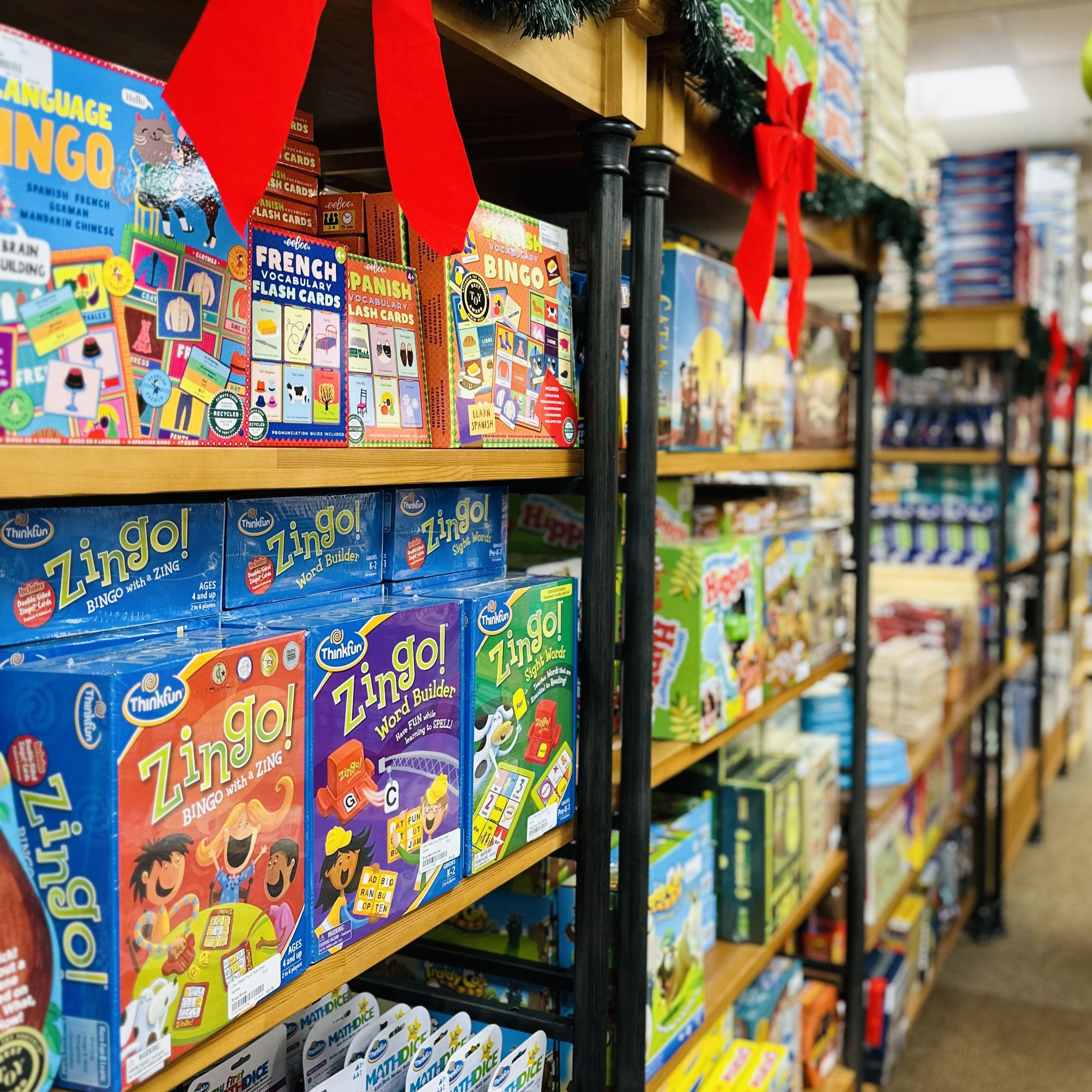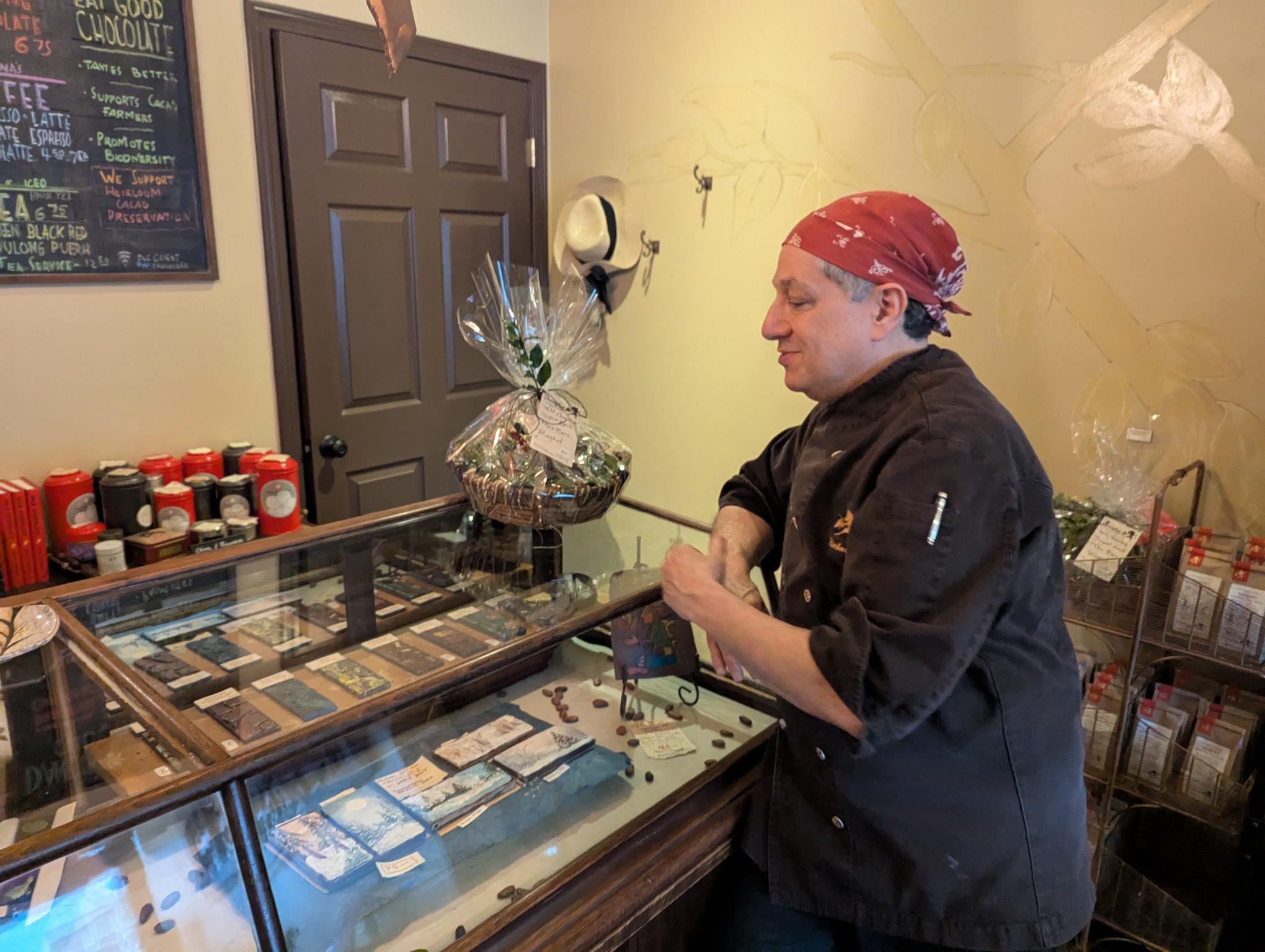The National Retail Federation predicts holiday spending will increase 2.5% to 3.5% this year
Bonbon boxes, loose-leaf tea and toys galore are some of the items shoppers have found at New Hampshire businesses this holiday season, spending amounts on par with pre-pandemic numbers, retailers and a state advocate reported in the last few weeks of December.
Littleton business owner Clare Brooks says her 10-person staff worked hard to prepare Little Village Toy & Book Shop for Black Friday and beyond, with the store participating in the post-Thanksgiving promotion day for the first time this year.
“We’ve been within two percentage points of the whole year (in sales) coming into it,” Brooks said on Dec. 12. “I feel like everybody on the team has done everything they can to get the shop ready.
The only thing I’m seeing is a little bit of a decline in foot traffic and sales.”
The small decline follows the shop’s strongest-ever year in sales, with Brooks viewing 2024 as a “post-COVID reset” to stabilize a period of rapid growth that began in 2020.
Observations
like those align with what Curtis Picard, president of the NH Retail
Association, says he anticipated going into the fourth quarter.
He
cited the National Retail Federation’s prediction that American holiday
spending will increase 2.5% to 3.5% this season, meaning the
organization expects sales to rise from nearly $956 billion last year to
between $979 billion and $989 billion this year.
“Any
time it’s positive, that’s a good thing, but certainly it’s not the
same high level that it was in the post-COVID years when we were seeing
significant increases year-over-year,” Picard said. “People weren’t
spending as much money on other things like travel, experiences and
concerts. They were more relying on things.”
But
as people have sought out seasonal events once more, some retailers
have tapped into adding these experiences into their stores to entice
customers. That’s the case for Shadow and Soul Emporium and Tea Lounge
in Keene, whose owner Brandie Wells has introduced an alternative to the
tradition of photos with Santa Claus.
Instead
of a jolly man in red and white, families turn out to meet and greet a
horned half-goat, half-devil figure hailing from Germany and central
Europe.
“We scheduled
Krampus to come for free photo opportunities, but we also booked some
tea and story time with Krampus, which one of them has already sold
out,” Wells said. “Some people call him the ‘anti-Santa,’ but he really
represents the ego in all of us. He only takes the children who stop
believing in Christmas, so it’s to teach children to continue to
believe.”

Board
and card games line shelves decorated for the holidays in Littleton
store Little Village Toy & Book Shop, which saw record sales last
winter. This year, owner Clare Brooks says Jellycat plush toys have
proven popular items. (Courtesy)
It’s
proven a beneficial move for the Monadnock Region metaphysical shop,
where Wells said that “sales are down significantly, unfortunately” from
2023, despite the business merging what were formerly twin storefronts
with eclectic and gothic flairs into one space last year. While sales on
“Plaid Friday” — the region’s “buy local” alternative to Black Friday —
were overall strong, they also remained down 20%, she said.
“My
average sale last year was $32. This year, the average sale so far has
been $24.25,” Wells said two weeks from Christmas Day. “When I look at
what people are buying, they are buying more lower-cost items.” The
merger also introduced the store’s tea lounge, which was in its early
stages of opening last holiday season but is now fully operational.
“Tea
is our No. 1 seller, and on the retail end it has helped the business
having tea because … it’s only $4 an ounce, people are getting something
healthy, and they’re having an experience when they have it,” Wells
said. “They get a sense of taking care of themselves and their
well-being. Now, we have 135 different teas.”
Drinks
are also a draw this season for Dancing Lion Chocolate on Manchester’s
Elm Street, where owner Richard Tango-Lowy and his small but steadfast
group of four chocolatiers create drinking chocolate in-house, from
cacao beans sourced directly from countries like Mexico, Bolivia and
Vietnam, his newest nation with a partnered farm.
The
drinking chocolate and shop were recently venerated in “Wild
Chocolate,” a book by Rowan Jacobsen that hit bookstores nationwide in
October telling the stories of heirloom cacao beans, used to create
chocolates via methods that Olmec peoples practiced 4 millennia ago in
Mesoamerica, or modern-day Mexico. Tango-Lowy himself even chairs the
Heirloom Cacao Preservation Fund.
The
humble business was also recently named “Confectionary Store of the
Year” by Luxury Travel Guide, topping 90,000 global submissions. The
honor means Dancing Lion isn’t just a Queen City hot spot for specialty
chocolates; it gets national and international sales online.
“We’re
always busy, even in summer, but sales start to ramp up in October,”
Tango-Lowy said from his store on Monday as it was closed to allow more
chocolate production.
“Around
Thanksgiving, it kicks up, and again about two to three weeks before
Christmas, people are starting to buy gifts. Then, we shut off the
online because we’ll be slammed next week for in-shop (customers).”
Tango-Lowy
estimated that sales would be up 20% from 2023 by the end of the
season. At the start of the week before Christmas, he pointed out a
handful of bonbon boxes on display for sale he guessed would be sold out
by Saturday, even as he and his team would be making more bonbons over
the next few days.
“About
a week before Christmas, we have to stop boxes (selling online),
because we had one year when we had suddenly gotten much more popular
that we just had no boxes and couldn’t even make them,” he said. “People
were coming in and looking distraught.”

Richard
Tango-Lowy, owner of Dancing Lion Chocolate in Manchester, looks over
edible painted chocolates with winter scene designs and a gift basket.
But more than those, he says bonbon boxes have been sellouts during the
holiday season. (Photo by Trisha Nail)
It’s
an indicator that even as online sales prove valuable to local
retailers, their owners must balance their digital audiences with their
face-to-face customers.
Picard,
at the NH Retail Association, said that’s important as he sees signs
that younger adults among Gen Z “appreciate shopping in stores a little
bit more than perhaps the millennials.”
“They’re turning into a
significant buying group,” Picard said. “They don’t shop exclusively at
stores, of course, but it’s nice to see that the younger generation is
appreciating what we call the experiential store experience.”
He said he also feels New Hampshire consumers understand that
local shops are more challenged than larger retail companies and want to
ensure their viability by supporting them over chain businesses, as did
Wells.
“I love how
people are intentionally shopping local, and have even had conversations
with them about how they don’t want to lose small businesses downtown,”
Wells said. “They’re taking a stance to buy less online and less from
big box stores.”
As
the state’s retailers look toward the 2025 holiday season, some wonder
whether tariffs might be one of those challenges. Following his election
win, President-elect Donald Trump has spoken about imposing a 60%
tariff on imported Chinese products, and a possible 25% tariff on
imports from Canada and Mexico.
On the national level, this move has toymakers concerned, as the cost would be shifted to consumers, resulting in higher-priced
items in stores, NPR reported earlier this month. Attractive prices can
be necessary for a local toy outlet like Brooks’ Little Village to keep
people coming in rather than seeking other businesses or eyeing online
shopping for better deals.
“I
can’t imagine any small business not thinking about tariffs, but
especially the toy industry, because a lot of stuff is made in China,”
Brooks said.
“A lot of
people want that (lower) price point, and you’re not always able to get
that price point when things are made in America. … I don’t think it’s
going to be a January 1 hit, but my intention is to stock up fast and
full early, right off in the new year.”
Brooks
said she began ordering for the 2024 holiday season as early as
February but noted that ordering timeframes are sometimes
company-dependent. Lego, for example, asks independent businesses like
Brooks to order their planned bulk stock a year in advance but allows
smaller orders to fill in empty inventory.
In
another case, Brooks had to ensure she would have enough plush toys
from the popular brand Jellycat months ahead of the holidays, as
customers have asked if she has specific animals and items the company
renders in stuffed form — a first, she added.
“It’s
insanely expensive, and they demand a higher margin on their (suggested
retail price) than a lot of companies,” Brooks said. “But if you don’t
order up enough, it has gone so fast.”
Going
into the season, Little Village was ready for this year’s influx of
purchases, with products floor to ceiling in the back of the business
and on some shelves.
“We
were way stocked by November, and have been receiving minimal shipments
along the way to fill in here and there,” Brooks said.